W.B. “Zim” Zimmerman didn’t have much money in his war chest when he ran for Fort Worth City Council last spring. And he might even be considered to be “charisma challenged.” But he did have one key factor in his favor that helped him defeat six other candidates, including well-funded, well-connected, downtown-establishment pick Eric Fox. That factor was the backing of Fort Worth police.
 Zimmerman’s election was another notch on the pistol for a police group with a knack for using political sway to maintain friendly faces on the city council – folks who come in handy during labor negotiations. Civilian employees typically don’t have to face the daily dangers endured by police each day, which is one reason why officials and voters have been willing to reward public safety employees with higher salaries and pensions.
Zimmerman’s election was another notch on the pistol for a police group with a knack for using political sway to maintain friendly faces on the city council – folks who come in handy during labor negotiations. Civilian employees typically don’t have to face the daily dangers endured by police each day, which is one reason why officials and voters have been willing to reward public safety employees with higher salaries and pensions.
Municipal workers across the country, and particularly police and fire groups, have been so good at politicking for increased pay and benefits that observers are starting to worry whether those successes could leave cities, including Fort Worth, vulnerable to financial straits. There’s even a web site, PensionTsunami.com, that tracks information and news coverage on cities and states that are having trouble in meeting their pension obligations. The list shows a nationwide problem.
“Anybody who understands how the city runs knows that the police and fire associations run the retirement fund, and the reason it’s in trouble is because it’s tilted so far toward police and fire,” said a former Fort Worth city official who asked not to be named because he doesn’t want to get crossways with police.
As cities battle budget shortfalls in an uncertain economy, many pension fund administrators have seen their portfolios falter even as their payment obligations escalate. A California-based group that fears rising pension costs will bankrupt cities, counties, and school districts in the next few years is drafting legislation to increase minimum retirement ages and reduce benefits for public employees. They’re starting in California and hope to spread the word to other states.
“It’s devastating the cities’ operating funds because the pension money comes out of those funds,” said Marcia Fritz, vice president of the California Foundation for Fiscal Responsibility. “If you’ve got a retiree at age 50 who is receiving $100,000 a year as a pension, the value of that is about $3.5 million.”
The pension watchdog group was founded in 2007 by former Los Angeles County Assemblyman Keith Richman to highlight the skyrocketing costs of public employee retirement benefits. “If we can get a win here, we can get this established across the country,” Fritz said. “It’s definitely a movement.”
Police and firefighter groups see things differently from Fritz. They’re involved in local and state politics to ensure competitive salaries and good benefits. And while both the Fort Worth Police Officers Association and the Fort Worth Fire Fighters Association wield plenty of local influence, the police group especially has created a reputation for its in-your-face approach to politics and contract negotiations.
Police justify their methods by saying that they have to get tough to get good labor contracts, they need good contracts to attract good cops, and they need good cops to reduce crime. “People don’t want to live in and businesses don’t want to operate in cities that have high crime rates,” said Fort Worth Police Officers Association President Rick Van Houten. “The public safety has to be your number-one priority. There are so many ripple effects through having good public safety.”
Fort Worth’s police and fire groups generally command higher salaries than their civilian co-workers, but city employees across the board – cops, firefighters, and civilians – retire with pensions. And a few workers have damn near hit the lottery.
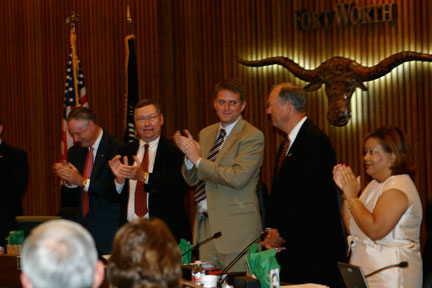 About a third of the 3,300 or so people now receiving city benefits are retired police and firefighters, but they account for about half the payout. And of the two dozen or so retirees drawing more than $100,000 a year in pension checks, most come from the police and fire departments.
About a third of the 3,300 or so people now receiving city benefits are retired police and firefighters, but they account for about half the payout. And of the two dozen or so retirees drawing more than $100,000 a year in pension checks, most come from the police and fire departments.
Former Police Chief Ralph Mendoza worked 35 years and retired at age 55 in 2008. He’ll draw $188,692 a year for the rest of his life. His interim successor, Pat Kneblick, retired at 52 in 2009. After working 26 years on the force, she’ll draw $113,614 a year from the pension fund. If Mendoza and Kneblick live well into their 80s, they’ll receive pensions for more years than they worked during their much-honored careers, and the pension fund will have shelled out more than $9 million to them in retirement.
Meanwhile, many rank-and-file police officers routinely rack up extra overtime hours during the last three years of employment to inflate their pension amounts. This practice, known as “spiking,” along with a faltering stock market, has strained the city’s Employees’ Retirement Fund and prompted questions on whether the fund can meet its liabilities in the coming decades.
Currently, the retirement fund is considered by city officials to be stable, with a $1.4 billion market value and an annual payout of about $100 million a year. But the fund might not be as dependable as people think. City officials gauge the fund’s health by assuming an 8.5 percent annual return on its investments – a return that would give the city enough money to comfortably cover its obligations. However, some financial experts doubt an 8.5 percent return is realistic. If the fund doesn’t hit that mark, its ability to meet obligations gets stretched, and residents might have to make up any shortfall with tax dollars. Yet most police officers and firefighters live outside the city limits – and thus avoid paying city property taxes.
Last year, the city council and pension board tackled the fund’s impending shortfall by increasing the city’s contribution to the fund from 10.7 percent to 15.7 percent of employee salaries. To make sure the city could cover the additional contribution, they eliminated pay raises for city employees.
In 2008, the economy was in a freefall, and the impending hit on this year’s budget was predictable. Still, the city council gave police officers a multi-year contract that promises at least 3 percent pay raises annually beginning this year and running through 2012. The council also changed a “step” raise policy so that officers reach their maximum pay four years sooner. Civilian city employees weren’t so lucky. They won’t receive raises in the upcoming budget year, when the city is facing a $61 million budget shortfall that will require cutting services and possibly raising taxes.
Marsha Anderson, field operations supervisor for the city convention center, has been a civilian employee for 24 years and, until recently, served as vice president of the Fort Worth General Employees Association. She relinquished her leadership role, frustrated by the difficulty in getting pay raises for non-civil-service workers.
“I am no longer [vice president of the employees’ group] because the bruises on my head from slamming into a brick wall were devastating,” she said. “It’s quite apparent that the crumbs that fall from the city’s breadbasket are what general employees end up with.”
Public safety groups wear instantly recognizable uniforms. Their fraternal closeness makes it easier to organize. Their high public visibility and resulting labor strength means they’re less likely to suffer job cuts, she said.
“Props to them – they’ve been smart enough to figure out how to get what they want,” she said. “The biggest challenge for general employees is we don’t all work for the same department.” Trying to get general employees in different departments organized is “not unlike herding cats,” she said.
Public safety employees have other aces in the hole: “meet and confer” privileges for police and collective bargaining for firefighters. These special bargaining powers give them more leverage when negotiating long-term contracts, a leverage not enjoyed by general employees.
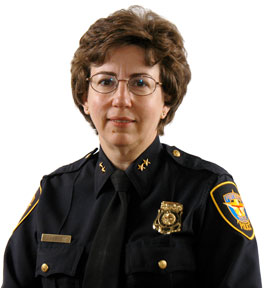 “I always opposed meet-and-confer and collective bargaining, whichever you want to refer to it as,” said former city manager Bob Terrell, who guided the city through tough economic times in the early 1990s, cut the tax rate, and played hardball when negotiating labor contracts. Terrell retired in 2001 after 25 years with the city and receives an annual pension of $108,998.
“I always opposed meet-and-confer and collective bargaining, whichever you want to refer to it as,” said former city manager Bob Terrell, who guided the city through tough economic times in the early 1990s, cut the tax rate, and played hardball when negotiating labor contracts. Terrell retired in 2001 after 25 years with the city and receives an annual pension of $108,998.
“The city and the city council should be in a position to make fiscal decisions on a year-to-year basis, and it was counterproductive to have a multi-year contract so that even when times are bad you had to honor it,” he said.
Last year, a suburb of San Francisco found out the hard way about the dangers of being overextended during a recession. Vallejo, population 135,000, declared bankruptcy in May 2008, and CNNMoney.com published an article under the headline “Fat Pensions Spell Doom For Many Cities” that blamed the bankruptcy on the city’s labor costs, including a pension plan that allowed police and firefighters to retire at age 50 and get an annual pension equal to 90 percent of their final pay (compared to 75 percent for city workers in Fort Worth).
The article predicted similar bankruptcies elsewhere because city leaders tend to bow to pressure from public safety groups and boost pay and pensions amounts during flush economic times. This can cause problems when the economy tanks. Earlier this year, Pacific Grove, Calif., began exploring bankruptcy because of its pension fund shortfalls.
If the California activists ever make it to Texas with their effort to put a damper on public employee benefits, they should expect some tough politicking. The police group here, as in many cities, has political muscle and doesn’t hesitate to flex it come election time, even if that means mailing out mean-spirited flyers like the Fort Worth cops did for the Zimmerman campaign.
For years, the Fort Worth Police Officers Association has turned to controversial lobbyist and political consultant Bryan Eppstein to help shape the outcome of local elections. They’ve paid him many thousands of dollars to help determine which candidates are most friendly to public safety groups and how to get them elected. But sometimes the police handle their own affairs. The June run-off between Zimmerman and Fox, both of whom are considered cop-friendly, must not have been considered critical because the police group didn’t hire Eppstein this year.
Zimmerman is a retired Lockheed Martin executive, and Fox is a Lockheed lobbyist. The city’s power structure was pulling for Fox and his long list of potentially exploitable contacts. Former mayors Bob Bolen and Ken Barr joined with Mayor Mike Moncrief to endorse Fox, and U.S. Rep. Kay Granger added her support. The Fort Worth Star-Telegram called Fox an “energetic, intelligent, let’s-make-it-happen guy” and cast Zimmerman as a “staid, say-no-to-everything sort.”
Police, though, deemed Zimmerman less likely to say no to them. And the cops were miffed about Fox skipping out on a May 6 public safety forum in Fort Worth to attend a Washington, D.C., fund-raiser.
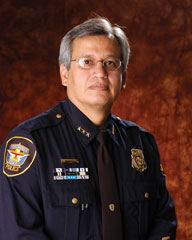 Rather than hire Eppstein, who’s no stranger to manipulative politicking, the police group waged its own negative campaign to defeat Fox. Shortly before the election, police distributed a glossy flier – identified as a “voter alert”- bearing a large photo of Washington lobbyist and convicted felon Jack Abramoff. A headline blared, “Lobbyist Abramoff Gets Four Years in Jail.”
Rather than hire Eppstein, who’s no stranger to manipulative politicking, the police group waged its own negative campaign to defeat Fox. Shortly before the election, police distributed a glossy flier – identified as a “voter alert”- bearing a large photo of Washington lobbyist and convicted felon Jack Abramoff. A headline blared, “Lobbyist Abramoff Gets Four Years in Jail.”
“Two candidates are running for city council: Eric Fox is a state and federal lobbyist. Zim Zimmerman is a retired businessman,” the flier said. It also warned about potential ethical misconduct by lobbyists who hold office: “Electing a lobbyist to city council is like asking the inmates to guard the prison.”
The Star-Telegram editorial board characterized the “bombshell mailer” as “despicable” and “possibly libelous.” A June 4 editorial said the flier was a “graphic depiction of hypocrisy” since the police group itself paid lobbyists such as Eppstein to work their magic in Fort Worth and in Austin.
“If the mailer’s authors believe what they wrote, wouldn’t that mean the benefits they secured through vigorous lobbying aren’t what’s best for Fort Worth taxpayers?” the editorial asked, adding that the flier “damaged the very people it’s supposed to be representing: the hard-working officers of the Fort Worth Police Department.”
Others weren’t as critical.
“The flier probably could have been tempered a little better, but in today’s world of political advertising, a lot of times it’s in your face,” one police officer said. “It’s like the Fort Worth Weekly – at times you’ve got to have the devil’s advocate.”
Police involvement in politics is crucial to ensure the steady growth in salaries and benefits that are needed to attract top candidates to the department, said David Garrett, who worked for 32 years with Fort Worth police, retiring in 2005. His last post was as a planning manager.
“I watched the POA grow into using the political system, which is fine,” he said. “That’s America.” As for the flier, Garrett said, “I’ve seen a lot nastier. I thought it was a little outrageous, but there is nothing illegal about it.”
Van Houten said it was an informative mail-out to let voters know that a Lockheed lobbyist was running for political office, a combination that can create conflicts of interest.
“A lobbyist should not also be an elected official,” he said. “It’s just a bad mixture. As a rule of thumb, what’s good for lobbyists is generally bad for taxpayers.”
He sees nothing hypocritical about the mailer blasting a lobbyist, even though police groups rely on lobbyists and consultants themselves. The cops aren’t seeking public office, so there is no ethical conflict in them paying a lobbyist, he said.
Van Houten doesn’t think it’s a coincidence that voters chose Zimmerman, the police association’s pick.
“We’ve got public trust,” he said.
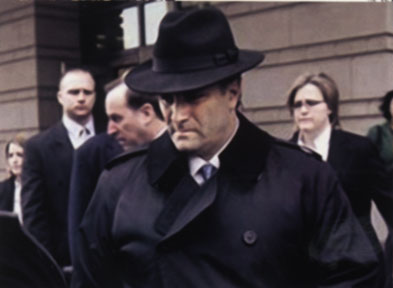 Fox campaign aide Jason Meier characterized the mailer as excessive and said the police group’s clout helped sway the election for Zimmerman.
Fox campaign aide Jason Meier characterized the mailer as excessive and said the police group’s clout helped sway the election for Zimmerman.
“There was some potentially libelous material in it, and it was incredibly unfair for the police officers association to have a picture of a convicted felon in a mail piece against someone like Eric Fox, who represents the largest employer in town and has never been anything but aboveboard,” he said. “Our opponent, without the police endorsement, would not have the ability to do as much mail and get the message out.”
Zimmerman did not respond to a Weekly interview request.
Terrell said he tried to stay out of politics during his long tenure as city manager and instead focused on balancing the budget. He didn’t like having to deal with separate labor groups and contracts for police, fire, and civilians. “You just have to be fundamentally fair to all the city employees, not just selected groups,” he said.
Now, when asked why public safety groups get involved in campaigns, he said that “obviously if you make contributions you expect to get considerations.”
Cathy Hirt enjoyed the police officers’ and firefighters’ endorsements during her time on the city council, and she credited those alliances with helping her and many other candidates get elected over the years. “We have in Fort Worth very well-organized and very politically astute police and firefighter organizations, and it’s to their credit,” she said. “They are politically savvy.”
Their endorsement meant they had her ear, but Hirt never felt obligated to them, she said. Blaming a group for being politically involved makes no sense when it’s the elected officials who have the final say.
“If the city council allows themselves to be walked over, it’s the fault of the council,” she said. “Sometimes you have to decide what’s fair or not. The fact that someone has voiced his opinion strongly and repeatedly doesn’t mean you have to respond. That’s political leadership. That’s the fault of the council – that’s not the fault of the people who lobby.”
Donating to campaigns, mailing out fliers, and hiring lobbyists can affect elections, but those elements are just part of the reason police and fire groups are so influential. Their primary strength with voters comes from the respect that cops and firefighters command through putting their lives on the line to protect the community,
Hirt said.
“People see them on the street and feel they are responding and that they really work hard,” she said. “There is a lot of respect in this community for those men and women, and that is why they carry the sway they do.”
Morris Matson expressed a similar respect for police officers and firefighters who put themselves in danger to protect and to serve. But he shares little of that admiration for the police association’s leadership.
Matson was Fort Worth’s assistant city manager overseeing finances from 1971 to 1984 before going into private business. In 1989 he ran against Kay Granger for an open seat on city council. The police group eyed him with suspicion since he was a former number-cruncher at city hall, whose job had been to be careful with city money.
“It had to do with my track record while I was the financial officer for the city, trying to make sure that the council did not approve a retirement plan for the police and fire employees that would be economically unsound for the future of the city,” he said.
The police group endorsed Granger and, with Eppstein’s help, released a flier that showed an elderly woman being confronted by an armed bandit, Matson recalled. It suggested that Matson was soft on crime.
Granger later became mayor, and Matson again ran for the open city council seat. The police backed his opponent, but Morris won in a runoff, one of the rare times when a police-backed candidate was beaten.
“They were shocked,” he said. “They get you on record as to whether or not you are going to support them, which means more money for less work and a higher retirement pay that is much better than any other city employee. I always said I would support a fiscally sound program but that I couldn’t support a giveaway program, which they have finally achieved now.”
When Matson came up for re-election in 1993, police association officials didn’t even bother to interview him (as they had in the past) before endorsing his opponent, political newcomer Becky Haskin.
The association launched a negative campaign against Matson. First, the group sent out a flier that showed a photo of Matson’s house and complained that he was a salesman who traveled outside of the city much of the time and couldn’t be counted on to stay focused on his community. The part about Matson’s traveling was true, and he was infuriated that police had released a photo of his house and told potential burglars that he was rarely home.
Then police released a mailer that characterized Matson as a thief.
During his term on the city council, Matson attended a book presentation. A local writer was donating a copy of his recently published biography on Charles Tandy to the downtown library. The book was unsigned. Matson is an avid Fort Worth historian and wanted an autographed copy of the book, but the author didn’t have any extra copies. So Matson asked the librarian if he could take the library book and get it autographed by the author, then walk across the street to a bookstore, buy a copy of the book at retail value, and give that one to the library.
The librarian agreed, and Star-Telegram columnist Mary Rogers wrote a short, humorous piece about Matson taking a library book. The police group distributed a mailer that took the story out of context.
“They saw it as an opportunity to take a humorous story and twist it and make it evil, which is what they enjoy doing,” Matson said.
Years after he left city government behind, Matson’s views on the police and fire labor groups and their impact on elections and pension funds haven’t changed much.
“They’ll do anything to get somebody on the city council who will support their absurd benefits that the city can’t afford,” he said.
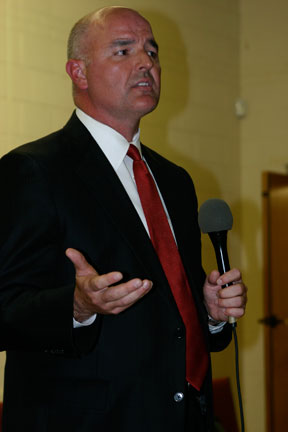 But big cities can’t afford crime waves either. In the early 1990s, Fort Worth was among the nation’s most crime-ridden big cities. Voters responded by approving a half-cent sales tax that currently provides an additional $50 million for crime-fighting, most of which goes to the police department. When the recession raged last year, city officials still increased the police budget while axing the health department and slashing jobs elsewhere.
But big cities can’t afford crime waves either. In the early 1990s, Fort Worth was among the nation’s most crime-ridden big cities. Voters responded by approving a half-cent sales tax that currently provides an additional $50 million for crime-fighting, most of which goes to the police department. When the recession raged last year, city officials still increased the police budget while axing the health department and slashing jobs elsewhere.
As a result, cops and firefighters stick around. Their average pay, counting overtime and including all ranks, is above $70,000. Civilian employees average about $48,000. The annual turnover rate for police is less than 3 percent and less than 1 percent for firefighters, while more than 8 percent of civilians leave their jobs each year.
Low turnover means an effective police force, Van Houten said. Cops usually spend two years being trained and naturally become better at their jobs over time.
“You want police officers who have been here,” he said. “Many of our beat officers out there know that when crime XYZ happens, they automatically have a list of suspects to follow. They know the different MOs and criminal tactics of people in that area.”
Cities compete for police recruits each year, and salaries and benefits play a large role in attracting and keeping officers. “We are competing against every municipality around and even throughout the state,” he said.
“Austin is the number-one [highest] paid” in Texas, he said. “Fort Worth, depending on which group of officers you look at, we’re anywhere from 15 percent below market median to 2 or 3 percent above.”
The police association’s success in securing competitive pay and benefits is due to “not making unrealistic demands and by doing our research,” Van Houten said.
City officials also understand that police work can be dangerous and demanding. Bodies break down over time. Cops in their 40s and 50s in foot chases and scuffles with younger criminals are prone to injuries. But police officers choose their career because they want to help their community, not to gouge taxpayers, the POA leader said.
“When we put on the bulletproof vest and gun and everything else, we are doing it in service and protection of others, not for the almighty dollar,” he said.
A former police officer who retired recently after 27 years with the Fort Worth police, including several years spent serving on the police association’s board of directors, spoke off the record about why public safety groups fight so hard for pay and benefits. He requested anonymity, he said, because talking frankly about that topic can ruffle a lot of feathers.
“What affected the retirement system is that the median income went up across the board, whether you’re looking at city managers, department heads, everybody,” he said. “That goes into your retirement – 75 percent of pay of the average of your last three years.”
Currently, 23 Fort Worth city retirees are receiving pension benefits of $100,000 a year or more, and 13 of them worked in the police and fire departments. The others include former administrators, an auditor, a human resources director, and two city attorneys.
But those are the top dogs. The average pension paid to retired cops and firefighters is about $50,000 a year. People who go to work for the city in their 20s and retire in their 50s can draw that amount in pensions and go to work somewhere else – or continue working for the city while drawing retirement.
The retired officer didn’t reveal his retirement pay but said it’s enough to allow him to live comfortably. And while he didn’t “spike” his pension amount by working overtime in his last three years to boost his average salary, he described the practice as both common and unfair.
“Some officers don’t have a life, and that opportunity is out there, and they would take it,” he said. “Myself, I worked my straight 40 hours with minimal overtime. I never thought I’d be making as much money as I did at the end. It was a comfortable living.”
The spiking issue exploded in 2007 after the pension fund was found to be facing a $411 million shortfall, and excessive spiking by employees was given as one of the reasons for the crisis. The Texas attorney general that year named Fort Worth’s pension as one of about 90 in the state that was at risk.
The police retiree attributed the attractive salaries and pensions to years of pressure from organized labor and to high returns in the investment market that made the pension funds stout, which in turn prompted city officials to be more generous. But at some point, he said, concessions might have to be made.
“You have to examine the entire picture,” he said. “That’s what a police officer is always taught.”
Last month, the Austin Police Department agreed to defer a 2.75 percent pay raise that had already been contractually promised to officers for 2010. The cut would save the city almost $5 million. An Austin police spokesman said the union agreed to eliminate the raise out of commitment to the community in a time of economic crisis.
Don’t expect the Fort Worth police association to jump on the give-back bandwagon.
“It’s unfortunate that the other city employees might not get a raise this year, but in the grand scheme of things our 3 percent pay raise is equivalent to about $3.3 million,” Van Houten said. “There is a $61 million budget shortfall. If that [$3.3 million] is what’s going to break the bank, then there’s a problem. There are other issues they need to address before they start cutting core services” — which in his view includes police pay raises.
Fort Worth has a higher tax rate than most cities, natural gas money flooding in, and a relatively healthy economy. City leaders in recent years have considered a publicly funded convention center hotel, a new city hall building, a town lake project, and any number of big-ticket items.
“When we’re short on funds, where do you cut?” Van Houten said. “All I can do is encourage our officers to continue giving the high level of service they are known for. Our public support comes from the day-to-day interactions that citizens have with our officers; it comes from their general feeling of safety.”










